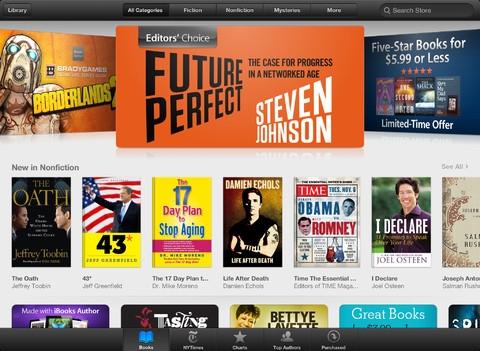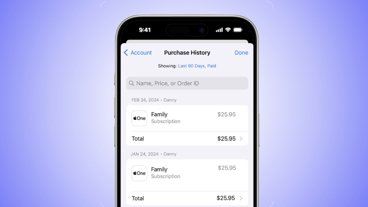Apple's iBooks grew 100% in 2012, maintaining 20% share of eBook market
Last updated
The ongoing antitrust trial by the U.S. Department of Justice alleging an effort by Apple to fix prices in the ebooks market has revealed that Apple's iBooks business grew by 100 percent last year, maintaining a 20 percent share of the overall market.
The government's puzzling case seeks to portray Apple as both a powerful co-conspirator with book publishers acting to raise prices and, at the same time, a failure in the market because it "forgot to focus on customers."
In a report on today's testimony by Publishers Weekly, Apple executive Keith Moerer, described as "a key figure in the negotiation of the agency pricing agreements in question," was asked by the government what Apple's iBookstore market share was at its launch in 2010 compared to 2012.
Moerer testified that Apple's share at launch was 20 percent of the overall market, and remains at the same level today. Between those dates, Apple added large publisher Random House in 2011.
The government blasted Apple's iBookstore as a "failure," charging that "Apple pricing was unfair to consumers,†and that “Apple sold fewer books because of the higher price caps."
In response, Moerer stated, "I disagree. Ebook sales grew 100% last year at the iBookstore and it had over 100 million customers."
The government's prosecutor countered "when you drop prices you sell more books!" to which Moerer answered, "sometimes, yes."
But when the prosecutor stated that "Apple forgot to focus on customers, that’s why the iBookstore is a failure." Moerer replied, "That's not true."
If its not fixed, don't break it
The government's case against Apple hinges upon the idea that the company colluded with publishers to raise prices above the $9.95 price point established earlier by Amazon.
Amazon executives charged that Apple's agency model was intended to "slowdown the success of the Kindle," which was being fueled by Amazon's wholesale model for ebooks, one that allowed Amazon to resell publisher's books below cost, undercutting the publishers' own hardcover pricing.
Testimony by publishers, however, indicates that the publishers themselves wanted to set their own prices rather than have industry wide pricing set by one, dominant reseller, just as record labels and movie studios sought to raise prices of some content above the prices Apple hoped to sell them.
Moerer also noted that Apple had set up price caps that publishers "pushed back" upon, and that they wanted “uncontrolled†pricing above what Apple hoped to establish.
Rather than trying to set prices with its agency model, Apple's Moerer said it was intended to avoid “windowing,†the practice of publishers withholding ebooks from the market to prevent cannibalization of their hardcover sales under the wholesale model.
"Apple is not against low price points,†Moerer stated, noting that its sells music, movies and other media at prices often below $3.
"We saw a lot of competition with the App Store on price and we thought it would be good for ebooks," Moerer stated, noting that HarperCollins planned to leverage the agency model to "experiment" with $3 to $5 types of new titles designed to "reach new audiences."
Escape from Amazon's domination of ebooks
Similarly, Macmillan chief executive John Sargent also testified today that he intended to “increase prices†for select groups of new books, rather than being pressured to raise prices by Apple.
Under cross examination by Apple's attorney Orin Snyder, Sargent stated that "Amazon had an early advantage in the e-book market and established barriers to entry,†drawing attention to its “below-cost pricing."
Sargent described the ebook market in early 2010 as dominated by Amazon, noting that "many companies were joining the market, but they lacked expertise or were undercapitalized and were proving to be unsuccessful."
He noted that included "even B&N, with great experience in physical books but no expertise in digital sales or devices. Google wasn’t a good retailer, Sony was a failure. There were lots of vendors with drawbacks,†he noted.
Asked by Apple's attorney, "Did Macmillan ever believe they had to move all resellers to agency?" he replied, "Absolutely not,†adding that there was no “side deal" to push publishers to the agency model.
And examined on the question of why he was interested in which other publishers had signed on with Apple, something the government alleged to be evidence of collusion, Sargent answered that "the more publishers the better for us because the iBookstore had a better chance of success with a broad selection of titles."
Apple’s senior vice president of Internet Software and Services Eddy Cue is scheduled to testify in the case tomorrow. Apple announced earlier this week that it would be bringing iBooks to the Mac with the release of OS X 10.9 Mavericks later this year.
 Daniel Eran Dilger
Daniel Eran Dilger














 Amber Neely
Amber Neely
 Thomas Sibilly
Thomas Sibilly
 AppleInsider Staff
AppleInsider Staff
 William Gallagher
William Gallagher
 Malcolm Owen
Malcolm Owen
 Christine McKee
Christine McKee










18 Comments
So the DOJ wants amazon to maintain a monopoly like position in the market?
Hopefully, we will learn from this trial some interesting data about the e-book market, just as we learned interesting data from the Samsung-Apple debacle.
So the DOJ prosecutor is a business man who determines if the company that takes in 200,000,000,000 in Revenue, has 575,000,000 customers buying real items at their stores and funnels these largely well healed high-end customers through their incredibly deep ecosystem is a failure at their mere 20% market share of another multi-billion dollar business???!!! This guy needs to open a retail model like Amazon, which sells at a loss, has a crazy Wall street bubble, undercuts all established businesses, drives every mom and pop retail operation into oblivion and hijacks every Internet retailer to their own website. Oh yeah, and in keeping with DOJ steals everyone's personal right to privacy on every Internet transaction.
Why is Obama wasting taxpayer dollars on this nonsense?
It must be difficult for these guys to be running back and forth between WWDC and a trial...